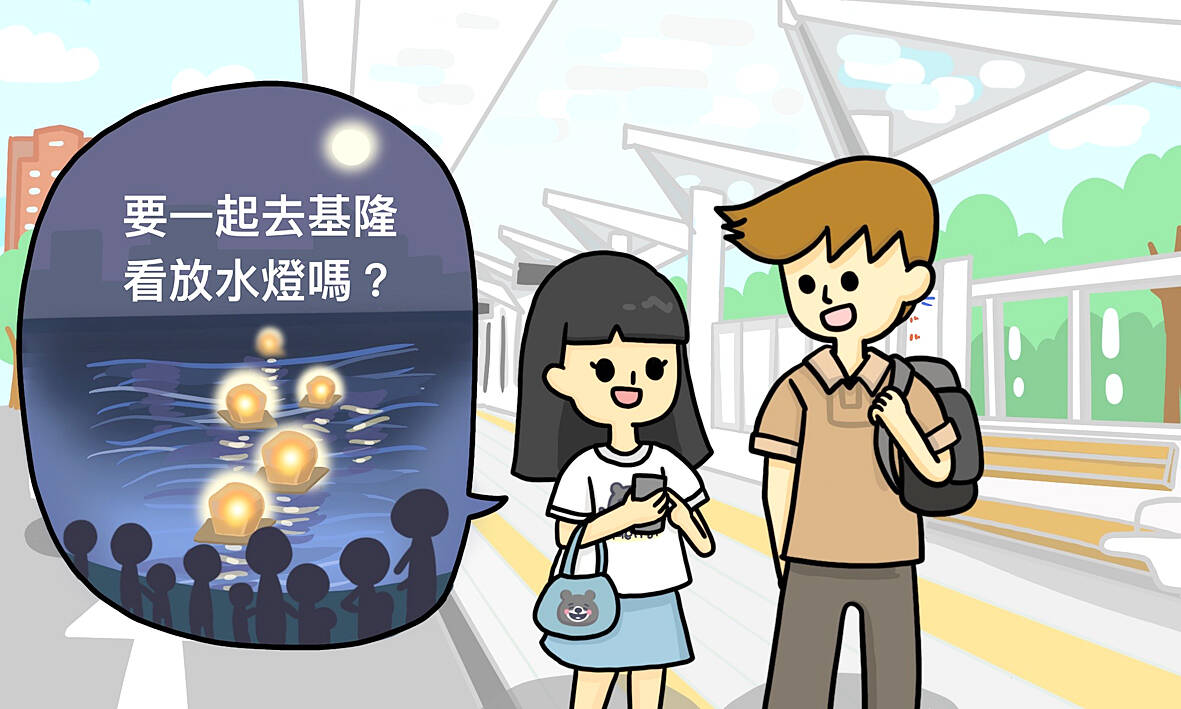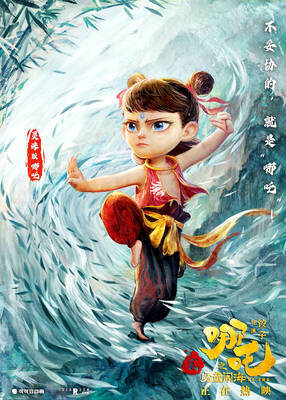對話 Dialogue
小實:馬克,我和明文要去基隆看放水燈遊行,你要一起去嗎?
Xiǎoshí: Mǎkè, wǒ hàn Míngwén yào qù Jīlóng kàn fàng shuǐdēng yóuxíng, nǐ yào yìqǐ qù ma?

馬克:「放水燈遊行」?那是什麼?
Mǎkè: “Fàng shuǐdēng yóuxíng”? Nà shì shénme?
小實:就是在放水燈以前,先給大家看看不同的水燈造型,還會有一些表演。
Xiǎoshí: Jiùshì zài fàng shuǐdēng yǐqián, xiān gěi dàjiā kànkàn bùtóng de shuǐdēng zàoxíng, hái huì yǒu yìxiē biǎoyǎn.
馬克:哦,那「放水燈」是什麼?
Mǎkè: Ó, nà “fàng shuǐdēng” shì shénme?
小實:我們會把紙做的東西放到水上,然後燒起來,讓它在水上看起來亮亮的。
Xiǎoshí: Wǒmen huì bǎ zhǐ zuò de dōngxi fàng dào shuǐshàng, ránhòu shāo qǐlái, ràng tā zài shuǐshàng kàn qǐlái liàng liàng de.
馬克:我看過影片,原來那叫「放水燈」。
Mǎkè: Wǒ kànguò yǐngpiàn, yuánlái nà jiào “fàng shuǐdēng”.
小實:對啊!這樣子找不到路的祖先或是鬼魂就可以找到回來的路了。
Xiǎoshí: Duì a! Zhèyàngzi zhǎo búdào lù de zǔxiān huòshì guǐhún jiù kěyǐ zhǎodào huílái de lù le.
馬克:好,我知道中元節也是祭祀祖先的節日,我跟你們去看看放水燈遊行吧。
Mǎkè: Hǎo, wǒ zhīdào Zhōngyuánjié yěshì jìsì zǔxiān de jiérì, wǒ gēn nǐmen qù kànkàn fàng shuǐdēng yóuxíng ba.
翻譯 Translation
Xiaoshi: Mark, Mingwen and I are going to Keelung to watch the water lanterns parade. Do you want to go together?
Mark: “Water lanterns parade”? What is that?
Xiaoshi: Before releasing the water lanterns, they will show you different water lanterns’ shapes, and there will be some performances as well.
Mark: Oh, then what is the “water lantern”?
Xiaoshi: We will put the things made of paper on the water, and then burn it to make it look shiny on the water.
Mark: I’ve seen that in a video, so that’s what a “shuǐdēng” (water lantern) is.
Xiaoshi: Yes! In this way, ancestors or ghosts who don’t know where to go can find their way back.
Mark: Well, I know that the Chungyuan Festival is also a festival for worshiping ancestors. I’ll go with you to see the water lantern parade.
單字片語 Vocabulary
1. 放水燈 (fàng shuǐdēng) water lantern
2. 遊行 (yóuxíng) procession, parade
3. 造型 (zàoxíng) modeling, shapes
4. 表演 (biǎoyǎn) to perform; performance
5. 燒 (shāo) to burn
6. 祖先 (zǔxiān) ancestor
7. 鬼魂 (guǐhún) ghost
8. 中元節 (Zhōngyuán jié) the Ghost Festival (Chungyuan Festival)
9. 祭祀 (jìsì) to worship
教材音檔 Audio Files
教材影片 Video Files:
https://www.instagram.com/celc.nou_tw/guide/_/17999106352646292/
實踐大學華語中心提供
By Shih Chien University Chinese Language Center: https://chineseusc.com/

Microsoft on Feb. 28 announced it was retiring Skype, the online voice and video call pioneer that the tech titan acquired in 2011. “Starting in May 2025, Skype will no longer be available,” said a post from Skype support on X, directing users to sign into Microsoft’s Teams platform for further use of its services. Skype was founded in 2003 by Scandinavians Niklas Zennstrom and Janus Friis in Estonia, revolutionizing Internet communication by offering free voice calls between computers and affordable rates for calls to landlines and mobile phones. Over the years, and as Internet speeds improved, Skype evolved to

A: China’s animated blockbuster “Ne Zha 2” also smashed a box office record recently. B: It’s No. 7 among the world’s best-selling films, grossing more than US$2 billion globally. A: I t has even become the world’s highest-grossing animated film, while the political metaphors in it are causing controversy. B: But who is Ne Zha anyway? A: Ne Zha, often spelled as “Nezha,” is actually a mythical teenage deity with superpowers. A: 中國動畫片《哪吒2》最近也打破紀錄。 B: 該片已衝上影史票房排行榜第7名,全球狂賣超過20億美元。 A: 聽說它甚至是全球最賣座的動畫片,影片中的政治隱喻卻引爆爭議! B: 但哪吒是誰? A: 哪吒的名字常被拼成「Nezha」,是神話中具有超能力的青少年神明。

People desire a sense of purpose in their lives, but they often remain idle unless they have a clear reason to act. This concept is illustrated by the retirement paradox. People work hard to prepare for a future without work but find life meaningless after achieving that goal. A study was carried out to determine if a reason, even a minor one, could encourage idle people to take action. __1__ Upon finishing the first, they were instructed to drop it off at a location either right outside the room or at a spot farther away, which would take around

Continued from yesterday(延續自昨日) https://www.taipeitimes.com/News/lang Results showed that only 32 percent were willing to walk farther for the same candy, but 59 percent chose to do so when promised different candy. Researchers also discovered that students who walked farther reported feeling happier during the wait. __3__ Idleness aversion can be applied in various settings. For example, Uber uses animations and real-time updates to keep customers from being bored while waiting. It can also be used in the design of office buildings to reduce elevator traffic. During busy times, it takes a while to wait for an elevator. __4__ Recognizing the power